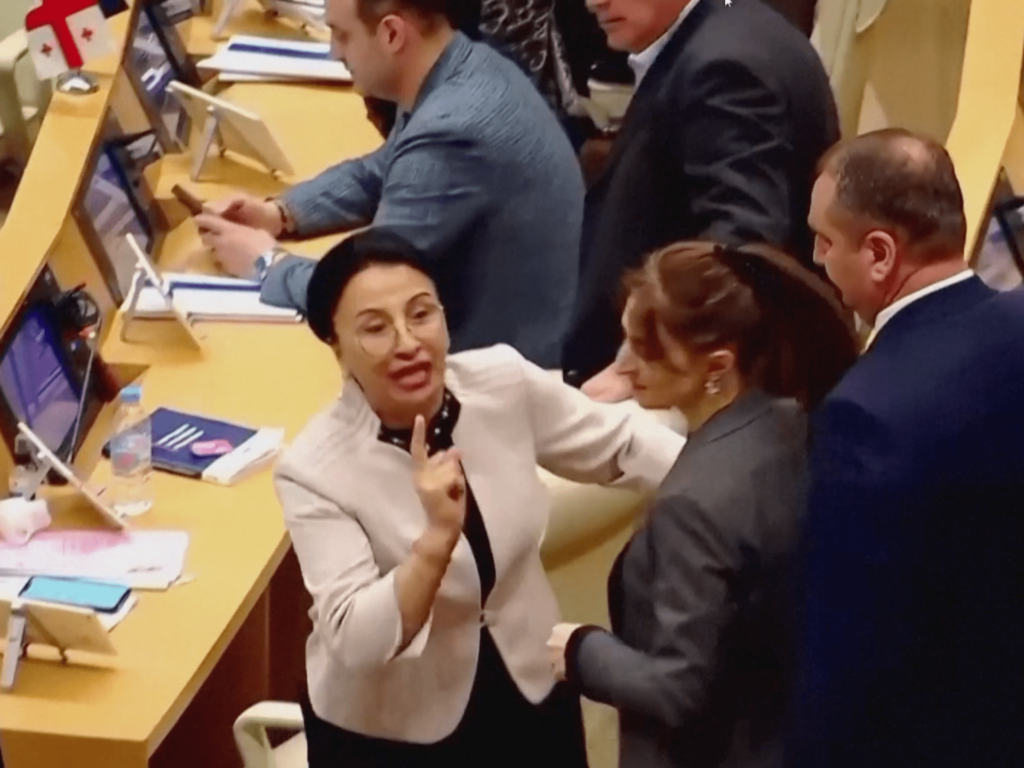Georgia’s Parliament has passed the third and final reading of a bill on “foreign agents” after weeks of protests against the measure and warnings from Brussels that its passage could harm the country’s bid to join the European Union.
There were scuffles between lawmakers on Tuesday before they voted 84 to 30 to pass the bill, clearing a major hurdle for the legislation to become law.
The draft now goes to President Salome Zourabichvili, who has said she will veto it, but her decision can be overridden by another vote in parliament, which is controlled by the governing Georgian Dream party and its allies.
The party’s push for the legislation has plunged the country in the South Caucasus into an extended political crisis and triggered mass protests.
The bill requires media and NGOs to register as “pursuing the interests of a foreign power” if they receive more than 20 percent of their funding from abroad. It is seen by many as influenced by similar legislation in Russia, which has been used to clamp down on the Kremlin’s political opponents.
Critics insist it poses a threat to democratic freedoms and the country’s aspirations to join the EU.
Georgian Dream was forced by mass protests to withdraw the bill last year. The revised effort to push the legislation through has again provoked huge demonstrations.
The government says the bill is needed to promote transparency, combat “pseudo-liberal values” promoted by foreigners and preserve Georgia’s sovereignty. Critics accuse the governing party of seeking to pull the country away from its European aspirations and back towards Moscow.
About 1,000 protesters picketed the fortress-like parliament building as the debate got under way on Tuesday. A major police presence and water cannon were deployed nearby.
Demonstrations have been held for weeks, peaking in the evening, when crowds numbering in the tens of thousands have mounted some of the biggest protests seen in Georgia since it regained independence from Moscow in 1991.
“This law is taking away my future,” 19-year-old protester Anano Plievi told the Agence France-Presse news agency outside parliament.
“I am angry and proud of all these people at the same time. We are going to keep going towards Europe.”
The EU, which gave Georgia candidate status in December, has repeatedly said the bill will be a barrier to Tbilisi’s further integration with the bloc.
European Council President Charles Michel said on Tuesday that “if they want to join the EU, they have to respect the fundamental principles of the rule of law and the democratic principles”.
Georgian Dream insists it still has ambitions of joining both the EU and NATO, even as it has adopted harsh anti-Western rhetoric in recent months.
Polls show Georgian public opinion is strongly supportive of EU integration while many Georgians are hostile to Russia over Moscow’s support for the breakaway regions of South Ossetia and Abkhazia.
The United States, United Kingdom, Germany, Italy and France have all urged Georgia to withdraw the bill.
The Kremlin, which denies any role in inspiring the Georgian bill, said on Tuesday that the crisis was Tbilisi’s internal affair and accused outside powers of meddling.
“We see an unveiled intervention in the internal affairs of Georgia from the outside,” Kremlin spokesperson Dmitry Peskov said.
“This is an internal matter of Georgia. We do not want to interfere there in any way.”
#Georgia #Parliament #passes #foreign #agents #bill #scuffles
Analysis and Future Implications
The passing of the “foreign agents” bill in Georgia’s Parliament has sparked significant controversy and unrest within the country. The legislation, which requires organizations receiving a significant portion of their funding from abroad to register as foreign agents, has been met with widespread criticism both domestically and internationally.
One key long-term implication of this bill is its potential impact on Georgia’s aspirations to join the European Union. The EU has made it clear that the passage of this legislation could harm Georgia’s chances of further integration with the bloc. This could have serious consequences for Georgia’s economic and political future, as EU membership is seen as a key driver of stability and prosperity.
Furthermore, the bill has raised concerns about democratic freedoms in Georgia. Critics argue that the legislation poses a threat to freedom of speech and civil society, as it could be used to target and suppress dissenting voices. This could lead to a further erosion of democratic values in the country, potentially pushing Georgia further away from its European aspirations.
In terms of future developments, it is likely that the passing of this bill will continue to fuel protests and unrest in Georgia. The mass demonstrations seen in response to the legislation are a clear indication of the public’s dissatisfaction with the government’s actions. It is possible that these protests could escalate further, potentially leading to more violent clashes between protesters and security forces.
Actionable Advice
Based on these insights, it is clear that the Georgian government needs to carefully consider the long-term implications of the “foreign agents” bill. It is crucial that the government takes into account the concerns raised by both domestic and international stakeholders, and works towards finding a solution that upholds democratic values and respects the rights of its citizens.
Additionally, the government should engage in dialogue with opposition parties, civil society groups, and other relevant stakeholders to address their concerns and find a way forward that is acceptable to all parties. This could help to de-escalate tensions and prevent further unrest in the country.
Overall, it is important for the Georgian government to act in a manner that upholds democratic principles and respects the rule of law. By doing so, Georgia can maintain its path towards European integration and ensure a stable and prosperous future for its citizens.

